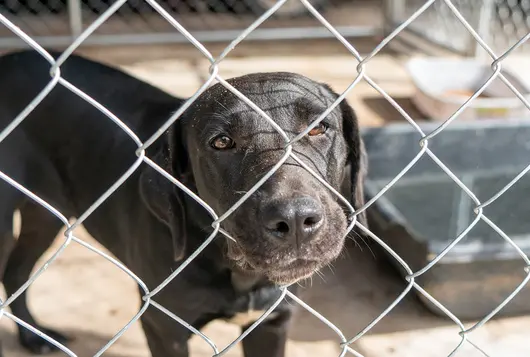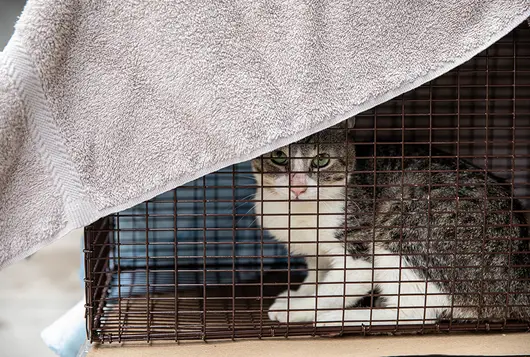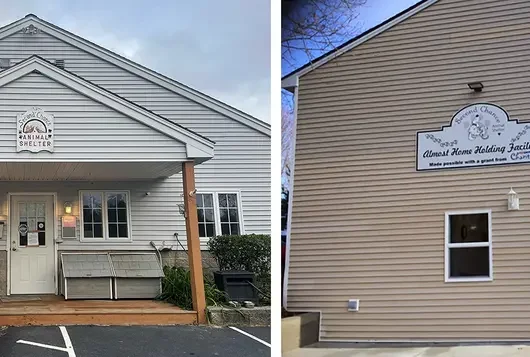Relocation Q&A with Mobile SPCA, Source Shelter for ASPCA’s Milestone Transport

MSPCA exterior, interior, and Whitney (with her seeing-eye buddy Emmy Lou)
In honor of the ASPCA's 200,000th relocated pet, we spoke with the Mobile SPCA (MSPCA) in Mobile, AL, the organization responsible for caring for Noah, a one-year-old cattle dog/Basenji mix, before his transport to Second Chance Animal Services in East Brookfield, MA.
Large numbers of stray animals, litters of puppies, and lack of community access to low-cost spay/neuter surgeries prompted the MSPCA to join the ASPCA’s Animal Relocation Program as a source shelter. The organization sends mostly puppies—who are transported to “destination shelters” in the Northeast and Midwest, although Noah is an adult.
Janine Woods, MSPCA’s Executive Director, joined the organization in 1984 as a volunteer shortly before the organization’s 100th anniversary.
Q: How many animals have you transported with the ASPCA’s Animal Relocation program?
A: Since becoming an ASPCA source partner shelter in 2018, we’ve sent 3,353 dogs and cats on transport as of December 31, 2021. This includes 698 animals in 2021, 756 in 2020, and 967 in 2019.
As a result of COVID-19 limitations, the ASPCA did monthly transports for us; now, we’re back to our pre-pandemic schedule of every two weeks.
Many of these ground transports are made possible thanks to the generous support of Nancy K. Silverman, an ASPCA donor who has provided funding for 8 Nancy Silverman Rescue Ride vehicles that have helped 95,000 homeless animals nationwide move from obstacle to opportunity.
Q: What are your annual intake and adoption numbers?
A: Our average yearly intake hovers at around 1,500. In 2021 it was 955 dogs and 490 cats.
On average, we place 200 dogs and 500 cats per year. In 2021 we placed 250 dogs and 488 cats.
Q: Where do your animals come from?
A: We have a good working relationship with three area municipal shelters, including the City of Mobile Animal Services, and we transfer in animals from them. Many animals, especially puppies, also come from the public. We vaccinate those animals and then ask people to foster them for two weeks so they can stay healthy before boarding a transport. We always have a waiting list of people wanting to bring in puppies because spay/neuter services are often hard to access here.
Q: How does Mobile SPCA supplement spay/neuter access?
A: We offer a $10 coupon to any member of the public to subsidize reduced fees offered by some veterinarians, but it’s not enough. The few vets who support our work are routinely booked and have staffing shortages. To keep up, we take a full van of animals to a Mississippi clinic once or twice a month.
Transport is critically important to us because it gives us an outlet –a positive outcome option –for all of our community’s puppies. Whenever possible, we also pay for the parents of the puppies to be spayed or neutered to help reduce the numbers.
Q: What is the impact of relocation on your shelter operations?
A: Obviously, it’s the reliable way to send animals to better opportunities in other communities, freeing up kennel space, and keeping animals out of the municipal shelters, which are always packed. Without transport, we’d never be able to find homes for all these dogs, and even though we have a lot of puppies, there are so many large breeds needing homes. Relocation reduces the burden on the entire community.
Q: What are the impacts of relocation on staff, specifically those working in a source shelter?
A: We love hearing about our animals’ outcomes and we appreciate it when adopters want to know the backstory of one of our animals. Sometimes they reach out to us. It’s very gratifying to realize the animals are going to a better place. When staff and volunteers get to see a pet they cared for in their new home and get a glimpse of their new life, it reduces compassion fatigue and motivates us to keep working. We appreciate that follow-up. It’s a morale booster.
“We love hearing about our animals’ outcomes. When we can get a glimpse of their new life, it reduces compassion fatigue and motivates us to keep working. It’s a morale booster.”
Q: Can you tell us a specific animal’s story?
A: Last fall, someone relinquished a young Pointer mix named Whitney. She had no eyes and was heartworm positive, which is common in our area. Finding placement was difficult. She lived in the kitchen area of our shelter office and then went to foster care until Katie Moore, the ASPCA’s Senior Manager of Animal Relocation, found placement for her with Wayside Waifs in Kansas City, MO.
Whitney was driven to Missouri on October 15. A week later, we got an update from the shelter that Whitney had become a staff favorite. A week after that, she was adopted. Her new family told us she fit right in, and that their other dog, Emmy Lou, acts as Whitney’s seeing-eye buddy. They sent pictures. Hers was a good story; it was so uplifting.
Q: What are the indirect impacts of relocation on your organization?
A: For the people who are relinquishing puppies—if they hold them until we can put them on a transport, the animals never have to enter our shelter, where no matter how well we care for them, they would be exposed to some stress and there would be some risk of illness. Transport also frees up resources for us to develop other impactful community programs.
Q: What was your first relocation experience like?
A: Four of us loaded a truck with 12 dogs in the wee hours of the morning. We all started crying and asking ourselves, ‘Who are these people taking our dogs away?’ In our hearts, we knew it would be fine, but it was hard to hand them over to strangers. Karen Walsh from the ASPCA Animal Relocation program said, ‘Janine, you must learn to trust your partners.’ Drivers also told us not to worry. Now, as soon as those taillights leave our gate, we’re thinking of the next bunch we want to send out.
Q: What lessons have you learned from your relocation experiences?
A: We’ve learned over the years which dogs don’t do well on transports. For example, it’s hard on shy or fearful dogs. Easygoing, confident dogs don’t seem to mind and may actually enjoy the adventure. But I won’t put any dog in a position where they will be frightened, and I’m grateful we can say to those animals we don’t transport, ”You might be here a while, but we’ll find you a home.”
Q: Anything else you’d like to share?
A: We’ve met some wonderful people through the ASPCA’s Animal Relocation program. Caring for animals and finding them homes seems to unify all of us.
We have lots more on this subject:



